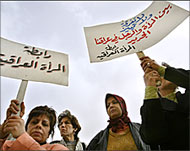Iraqi women divided over family law
Thousands of Kurdish women have marched in northern Iraq against an interim Governing Council decision to repeal long-standing secular family laws even as 500 veiled women gathered in the Shia city of Najaf to support it.

The decision is yet to be made into law by Paul Bremer, the occupation’s chief administrator.
Some 5000 women marched in the city of Suleimaniyah, said organisers from the Kurdistan Women’s Union affiliated to the Patriotic Union of Kurdistan (PUK), which is headed by council member Jalal Talabani.
“It is a heavy blow for women of Iraq and Kurdistan,” said the
union’s chairwoman, Kafia Suleiman, accusing those who took it of “ignoring the long struggle of women in this country.”
Scrapping secular laws
Last December, under then chairman Abd al-Aziz al-Hakim, head of the Supreme Council for the Islamic Revolution in Iraq (SCIRI), the Governing Council voted to scrap secular family laws and place them under Muslim religious jurisdiction.
The 1959 code was once considered the most progressive in the Middle East, making polygamy difficult and guaranteeing women custody rights in the case of divorce.
“This decision is unacceptable for an overwhelming majority of
Iraqi people. It violates not only the rights of women of Iraq and Kurdistan, but also international conventions,” said Takhshan Zangala, head of the Kurdistan Women’s League, affiliated to the communist party.
 |
|
Some Iraqi women think the |
The demonstrators marched on the PUK power base, where a group were met by officials and a representative from the US-led occupation ruling Iraq, where they called on them to reverse the decision.
The PUK effectively rules Suleimaniyah, 330km northeast of Baghdad, while its main rival, the Kurdistan Democratic Party run by Massoud Barzani, controls the northern city of Arbil.
Pledging ‘full support’
Meanwhile, Shia women’s groups demonstrated in Najaf, 180km south of Baghdad, and handed out a statement to journalists pledging “full support to resolution 137 of the Governing Council”.
Demonstrator Umm Abis said putting women’s affairs under the authority of SCIRI “conformed to Sharia” or Islamic law.
|
“Sharia guarantees the goodwill of people and sets standards for divorce, polygamy, and marriage. We can not fight the orders of God. We refuse any law that calls for scrapping the Sharia law.” Sokayna al-Sumaydie |
On the Sunni front, Sokayna al-Sumaydie, head of the Islamic Union for the Women of Iraq backed basing family law on Sharia. “We are with any voice that calls for implementing Sharia in the family law,” al-Sumaydie told Aljazeera.net
“Sharia guarantees the goodwill of people and sets standards for divorce, polygamy, and marriage. We cannot fight the orders of God,” she said adding: “We refuse any law that calls for scrapping the Sharia law.”
On Tuesday, dozens of Iraqi feminists gathered in central
Baghdad to urge Bremer to guarantee better representation for women and not sign the decision into law.
All decisions passed by the Governing Council must be ratified
by Bremer to come into effect.